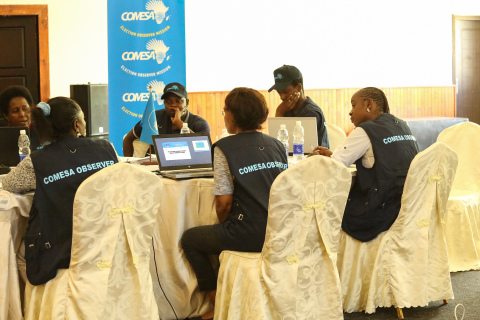
Lusaka, Tuesday, April 14, 2020: With the outbreak and the global spread of the Coronavirus, the looming socioeconomic and political ramifications will be severe. This is largely because of the costly but necessary measures that have been established to contain the spread.
According to an analytical report prepared by the Governance, Peace and Security (GPS) Programme at COMESA Secretariat, it is apparent that governance, peace and security, both at the national and regional levels will be impacted in several ways. One of them being the current democratic gains.
“Since the reintroduction of multiparty democracy in the region in the 1990s, member States have made steady progress towards institutionalizing and consolidating democracy,” the Report says.
One of the measures for democratization is how and when elections are conducted, as this has a ripple effects on other measures such as transparent competition and inclusiveness.
Over the years, most countries in the region have organized elections periodically and strengthened the key institutions of governance to ensure participation, transparency, accountability, the rule of law and promotion of national cohesion.
“With the Coronavirus raising concerns about close contact and individual health safety, the elections scheduled for this year in countries such as Malawi, Burundi and Seychelles are likely to be postponed to later dates, while in some cases, indefinitely,” the Report says, noting that Ethiopia has already postponed both presidential and parliamentary elections.
The postponement of these elections will likely alter the electoral calendars and every effort will have to be made to ensure that they do not have spill-over effects in other sectors such as education.
Further, rescheduling of elections, could in some cases trigger disagreement among political players who may not agree to the new dates or other electoral modalities that may be put in place.
“The postponement of elections, unless well managed, could raise anxiety among the political players and the electorates as has happened in the past, especially where the stakes are high,” the Report further notes. “The situation is further likely to impact on campaigns and subsequently on voter turnout even after the COVID-19 is contained.”
The Report states:
“If for example, governments decide to continue to implement stringent measures to prevent reinfection and further spread of the virus, then campaigns may be restricted in some situations. As a result, political parties may not be able to adequately share their policies and programmes with the electorates.”
If the past is anything to go by, the Report notes, opposition parties in such cases could accuse the government of deliberately disenfranchising and profiling voters in certain areas (especially areas perceived to be opposition zones), and such allegations have often led to conflicts.
It is also expected that the respective governments may not have enough resources to organize elections, having diverted most of it to contain the COVID-19 pandemic. In addition, the donor countries, who have also been hit hard economically, are unlikely to extend much resources for the running of elections as they have done in the past.
It is therefore likely that, critical stages in the electoral cycle such as voter registration, civic and voter education will be affected. This will negatively affect voter turnout and participation of the electorates in the scheduled elections. Cumulatively, these challenges are going to erode the gains made in consolidating democratic values in the region.
The Report concludes that consensus building among electoral stakeholders will be critical in setting the new dates and averting conflict and political disagreement, which is most undesirable in the aftermath of COVID-19.
The COMESA GPS Programme supports member countries in governance, peace and security issues including election observations. This is in response to directives of the COMESA Ministers of Foreign Affairs.
Owing to the current uncertainties occasioned by COVID-19, COMESA Secretariat will not be able to roll out its programme on elections and democratization, at least for now.




